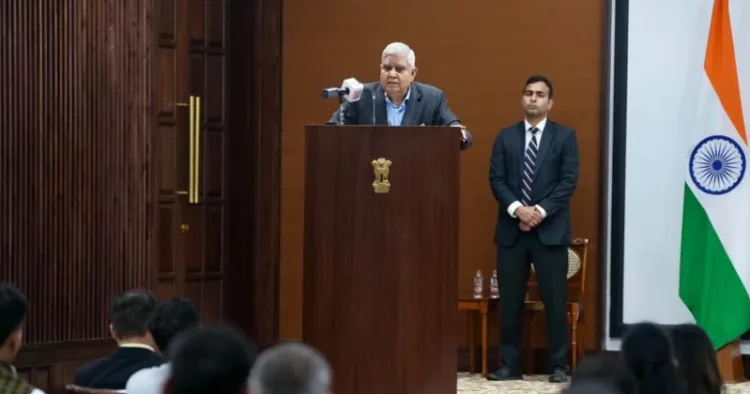Vice President Jagdeep Dhankhar lauded Uttarakhand’s decision to implement the Uniform Civil Code (UCC), calling it an auspicious sign in the country’s democratic journey. He emphasised that this move aligns with the vision of India’s framers of the Constitution, particularly the Directive Principles of State Policy. Article 44 of the Indian Constitution mandates the adoption of a UCC, and Dhankhar expressed his confidence that other states will follow suit soon.
Speaking at the inaugural program of the fifth batch of Rajya Sabha Internship Programme and the launch of an online portal for the initiative, the Vice President highlighted the importance of UCC in fostering gender equality, referencing its long-discussed role in the constitutional debates. “How can anyone oppose something which is mandated by our Constitution?” Dhankhar remarked, referring to those who criticise the UCC, emphasising that such opposition was driven by political motivations rather than constitutional mandates.
Addressing concerns around illegal migration, Dhankhar strongly criticised the millions of illegal migrants as a threat to national security, societal harmony, and democracy. He stated, “These people are not wedded to our nationalism” and underscored their potential to disrupt electoral systems. The Vice President called for immediate and decisive action to address this issue, stressing that delaying the resolution of this challenge would be detrimental to India’s sovereignty.
The Vice President also touched on India’s impressive economic growth over the past decade, attributing the nation’s progress to infrastructural developments and policies aimed at improving access to essential services like health, education, and housing. He acknowledged the increasing aspirations of the Indian population, noting that people now have greater access to resources like toilets, gas connections, and air connectivity, leading to heightened aspirations among the youth.
Dhankhar also reflected on the ambitious vision of Prime Minister Narendra Modi, particularly the development of aspirational districts, which have transformed from neglected regions into growth hubs. “India is the only nation to have achieved such a huge economic upsurge,” Dhankhar remarked, pointing to exponential growth in infrastructure, technology, and policies benefitting the youth.
On the topic of national dialogue, Dhankhar stressed the importance of debate, discussion, and deliberation in addressing major global challenges like climate change and geopolitical conflicts. Drawing inspiration from India’s Constitution-making process, he emphasised the role of dialogue in building consensus, a model that India continues to embody in its inclusivity and adaptability.
The Vice President also spoke about Dr. B.R. Ambedkar’s contribution to the Indian Constitution, particularly his stance on Article 370. Dhankhar revealed that Ambedkar had declined to draft Article 370, highlighting his commitment to India’s sovereignty. Had Ambedkar’s will prevailed, Dhankhar noted, the nation would have avoided the “huge price” paid due to the provisions of Article 370.
In conclusion, Dhankhar’s speech reflected a firm commitment to upholding constitutional values, advancing national progress, and ensuring unity and security for all citizens.



















Comments